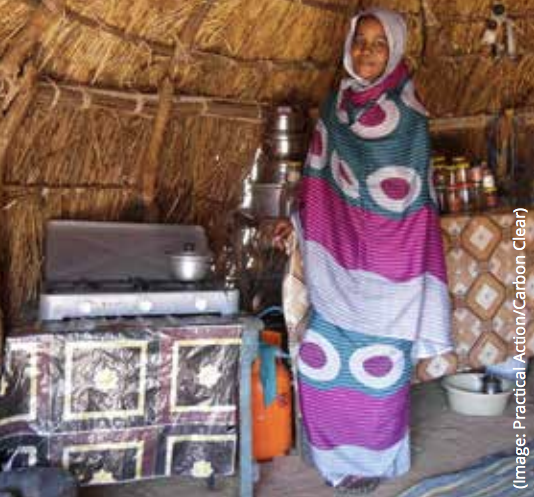Carbon credits from low smoke stoves project in Sudan
Over 90% of households in North Darfur, Sudan, depend on firewood and charcoal for cooking. The country is experiencing many negative effects of climate change, including drought and desertification, exacerbated by forest degradation from woodfuel gathering.
In the Low Smoke Stoves project in North Darfur, LPG fuel and stoves are used as a substitute for wood and charcoal in household cooking.
Practical Action and Carbon Clear launched the project in 2008. The objective was to promote widespread use of LPG for cooking in El Fashir. Poor households gained access to LPG for cooking through a microfinance credit revolving fund. Participants were trained on the efficient use and safety of LPG, and educated on the negative environmental impacts of excessive fuelwood use.
As of 2017, more than 11,000 LPG “start-up” equipment sets have been distributed by the project, and a 95% reduction in key pollutants has been observed when the households switch from solid fuels to LPG, according to Practical Action. Almost 100% of households acknowledge that air quality has drastically improved with LPG use.
The project also reduced regional deforestation by saving approximately 80 kilograms of wood, or 30 kilograms of charcoal, per household each month. LPG has reduced overall fuel consumption by up to 70%. The LPG cookstoves cut more than 48,000 tonnes of CO2 emissions between 2013 and 2017, and the estimated greenhouse gas emissions reduction over ten years is approximately 300,000 tonnes. This is the first Gold Standard certified project to use LPG, as well as Sudan’s first carbon credit project.
By delivering access to LPG for cooking, the Low Smoke Stoves project continues to improve the air quality, and reduce pressure on dwindling forest resources in Darfur.

“I spent 3-4 hours cooking before. Now, in one hour I can do everything. I recommend LPG to my friends. I tell them it has been a benefit and they should go and get it. With LPG, my husband is now willing to help me.”
Fatima Suliman Ahmed,
23 from Darfur, Sudan